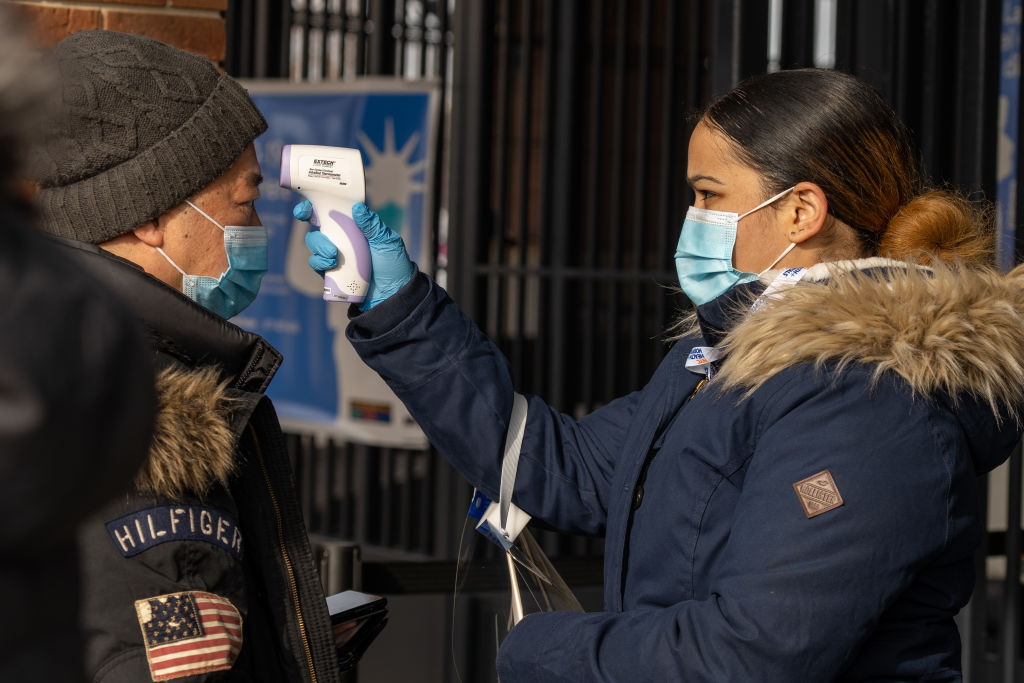Biden promised COVID-19 vaccine equity. There isn't enough data to know if that's happening.


A free daily email with the biggest news stories of the day – and the best features from TheWeek.com
You are now subscribed
Your newsletter sign-up was successful
Almost a year into the COVID-19 pandemic, infections, deaths, and economic effects continue to hit people of color harder than white people.
President Biden acknowledged the virus' disproportionate toll, particularly on Black and Latino people, when taking office, pledging to put equity at the forefront of vaccine distribution efforts. But after two months of vaccine distribution, the Centers for Disease Control and Prevention doesn't have enough data to know if it's actually achieving that goal, The New York Times reports.
So far, the CDC has gathered race and ethnicity data for just 52 percent of COVID-19 vaccine recipients, a report issued last week indicated. Some states prevent the collection or sharing of this kind of data, while other times, those fields are just left blank when people sign up to receive the vaccine. Epidemiologists have since been forced to begin "filling in the gaps by cross-referencing against secondary sources," Arkansas' health secretary Dr. José Romero told the Times.
The Week
Escape your echo chamber. Get the facts behind the news, plus analysis from multiple perspectives.

Sign up for The Week's Free Newsletters
From our morning news briefing to a weekly Good News Newsletter, get the best of The Week delivered directly to your inbox.
From our morning news briefing to a weekly Good News Newsletter, get the best of The Week delivered directly to your inbox.
The Biden administration has prioritized sending vaccines to underserved areas, including with a shipment of vaccines headed to federally funded clinics next week. But former Baltimore health commissioner Dr. Leana S. Wen said the typical "first-come, first-served" method of distribution still favors the "privileged." And it's not just an "empathy issue," Dr. Marcus Plescia, chief medical officer of the Association of State and Territorial Health Officials, told the Times. Identifying groups "most likely to get affected and die" is the best way to control disease spread in the first place, he said.
The lack of data is sure to complicate an already slow distribution process. As two senior Biden administration officials tell The Daily Beast, the U.S. seems unlikely to reach herd immunity until after Thanksgiving thanks to supply issues and concerning variants driving up transmission.
A free daily email with the biggest news stories of the day – and the best features from TheWeek.com
Kathryn is a graduate of Syracuse University, with degrees in magazine journalism and information technology, along with hours to earn another degree after working at SU's independent paper The Daily Orange. She's currently recovering from a horse addiction while living in New York City, and likes to share her extremely dry sense of humor on Twitter.
-
 The Week Unwrapped: Have televised confessions quelled protests in Iran?
The Week Unwrapped: Have televised confessions quelled protests in Iran?Podcast Plus, why has Elon Musk turned from Mars to the Moon? And will the BBC prove to be a puzzles champ?
-
 The week’s best photos
The week’s best photosIn Pictures An Andean god, a rogue squirrel, and more
-
 AI surgical tools might be injuring patients
AI surgical tools might be injuring patientsUnder the Radar More than 1,300 AI-assisted medical devices have FDA approval
-
 Trump HHS slashes advised child vaccinations
Trump HHS slashes advised child vaccinationsSpeed Read In a widely condemned move, the CDC will now recommend that children get vaccinated against 11 communicable diseases, not 17
-
 FDA OKs generic abortion pill, riling the right
FDA OKs generic abortion pill, riling the rightSpeed Read The drug in question is a generic version of mifepristone, used to carry out two-thirds of US abortions
-
 RFK Jr. vaccine panel advises restricting MMRV shot
RFK Jr. vaccine panel advises restricting MMRV shotSpeed Read The committee voted to restrict access to a childhood vaccine against chickenpox
-
 Texas declares end to measles outbreak
Texas declares end to measles outbreakSpeed Read The vaccine-preventable disease is still spreading in neighboring states, Mexico and Canada
-
 RFK Jr. shuts down mRNA vaccine funding at agency
RFK Jr. shuts down mRNA vaccine funding at agencySpeed Read The decision canceled or modified 22 projects, primarily for work on vaccines and therapeutics for respiratory viruses
-
 Measles cases surge to 33-year high
Measles cases surge to 33-year highSpeed Read The infection was declared eliminated from the US in 2000 but has seen a resurgence amid vaccine hesitancy
-
 Kennedy's vaccine panel signals skepticism, change
Kennedy's vaccine panel signals skepticism, changeSpeed Read RFK Jr.'s new vaccine advisory board intends to make changes to the decades-old US immunization system
-
 Kennedy ousts entire CDC vaccine advisory panel
Kennedy ousts entire CDC vaccine advisory panelspeed read Health Secretary RFK Jr. is a longtime anti-vaccine activist who has criticized the panel of experts
